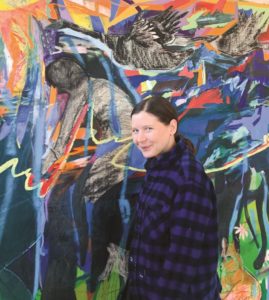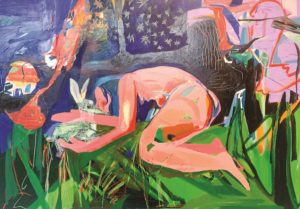Large, brightly colored canvases, some spanning an entire wall, layered with images of figures, birds in flight, a fox, or flowers, greet the viewer entering Hannah E. Morris’s studio at the Fine Arts Work Center in Provincetown. Countless tubes of oil paint cover almost every surface, and brushes stand like bouquets in jars. Morris, the instigator of this creative storm, seems almost invisible in it, her unassuming demeanor a curious contrast to the striking nature of her work.
The visual arts fellow at the work center approaches each new painting as a bold, intuitive step into the unknown. Her art will be on view for a one-week exhibit with an opening this Friday at FAWC’s Hudson D. Walker Gallery.

“I usually begin by getting rid of the white and either spilling paint or drawing without intention,” she says. “I try to move with the work. These are big pieces. I don’t make them specifically because I want to create large paintings, but rather because I want to use my body and feel my weight when I’m making a move. I like to feel where my flesh is hanging on my body and try to create a touch to the canvas that resonates with how I’m feeling emotionally at the moment. I move the painting off the wall and onto the floor, negotiating the space as if arguing with someone or making love.”
Being emotionally awake and open to the unexpected is central to Morris’s creative process. Since arriving in Provincetown, she has been working on what she describes as “adventurous experiments.” She speaks in a soft, youthful voice.
“I think of the narratives in my work, like when you meet a stranger and they divulge something insignificantly personal about themselves, unnoticeable to them,” she says. “But you think, that’s so strange! They’ve just shown themselves to me without even knowing that they did.”
Likewise, the images that appear in her work often surprise and sometimes unsettle her. “I try to keep my expectations open,” Morris says, “but, of course, I still get caught up with fear and disappointment when things are not feeling right in the studio. When fear of where to make a move creeps into my mind, I have to reorganize and try to get back to a point of fearlessness.”
Morris’s paintings harbor personal narratives that draw the viewer in, especially when experienced in person. It is as if Morris, by baring her inner self, invites the viewer to discover his or her own.
“What is most important for me is for the viewer to feel an emotional response to my paintings,” she says. “They are never going to see exactly the same story that I see or know about the layers of hidden imagery in my painting. I would never want to prescribe a story to the viewer. For me that would leave no room for them to come in and project their own narrative. What matters to me is that they feel something, that they interact with their own stories.”

Before coming to Provincetown, Morris was living in England and completing a master’s degree in contemporary art theory at Goldsmiths, University of London. She’ll be returning to London this summer to begin work on a Ph.D.
“I really do like theory,” she says. “It has opened me up to how I tell a story, and how I can understand myself and humanity on a wider plane.”
Having grown up in Chatham, N.Y., and the Berkshires, Morris describes the landscapes of her childhood as being central to her work. “We had no neighbors, just lots of mice running through our cupboards,” she says. “We would play elaborate games outside for hours on end, in the mud and running through the trees. I don’t remember ever watching TV or even playing with toys — the land was always the material.”
She says that being a fellow at the work center in Provincetown has been a privilege. “Just to have no worries but to make work in a beautiful studio is a true dream, not to mention the nature that surrounds these studios,” Morris says. “It’s been great for me to be by the ocean. If I’m having a bad day, I walk down to the breakwater and cross the rocks to the other side of the beach, and I can breathe again.”
Morris feels lucky to share her time here with a partner, Rob Rodak, a writer from London. Together they walk for miles and miles, exploring new terrain throughout the Outer Cape. Those walks, she says, “full of deep discussions about philosophy, theory, and the work we are making, while looking around at the sea, trees, or dunes, have wonderfully crawled into my work.”
Inner Landscapes
The event: Opening of exhibit of work by visual arts fellow Hannah E. Morris
The time: Friday, Feb. 28, 6-8 p.m.
The place: Fine Arts Work Center, 24 Pearl St., Provincetown
The cost: Free
